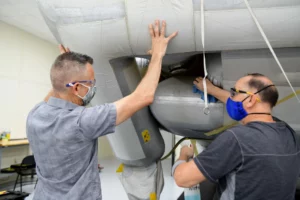Unlock your Career Potential
At Aircraft Maintainer we want you to have an edge when job searching – thats why we want to talk about your future career potential. We know you made a great decision to get an FCC General Radio Operator License as a way to set yourself apart from other maintainers. Since you already did the work to get the license, we did the research work for you so you’ll know about the jobs you qualify for with your General Radio Operator License.
Don’t have your FCC GROL yet? Click
HERE and we can remedy that situation.
Avionics Technician
Avionics technicians perform inspections and tests on all the electrical and computer systems that keep airplanes, helicopters, and spacecraft flying. They also assemble and install avionics equipment on various aircraft and aerospace projects, including radar systems, radio communications equipment, and flight controls. Additionally, avionics technicians are responsible for testing avionics systems to ensure their proper functioning before an aircraft can take off. They also carry out repairs on malfunctioning systems.
Avionics technicians do not need to possess an FCC GROL license or certification in order to test aircraft instruments, assemble parts, fix broken ones, or install software and instrument panels. However, those who hold a General Radiotelephone Operators License have the opportunity to specialize in communications equipment, allowing them to work independently or supervise others on the job. In such cases, there is the potential for a higher salary with the addition of the GROL.
An Avionics Technician can expect to earn a salary anywhere from $55k-$90k (variances should be expected depending on the state of employment, hiring company, additional credentials, and experience). Click
HERE for some open jobs today!
Aircraft Electronics Technician
An aircraft avionics technician actively tests, inspects, and repairs various pieces of avionics equipment, such as fuel system gauges, radar and navigation systems, radios, and other technical equipment necessary for flying an aircraft. In this career, you are responsible for keeping careful documentation and logs of your maintenance work, adjusting or replacing malfunctioning components and systems, installing electrical systems, and setting up test equipment and operational support tools for ground crews. As an aircraft avionics technician, you utilize a variety of hand tools, including soldering irons, voltmeters, oscilloscopes, and circuit testers.
An Aircraft Electronics Technician can expect to earn a salary anywhere from $48k-$76k (variances should be expected depending on the state of employment, hiring company, additional credentials, and experience).
HVAC Install Technician Helper
HVAC helpers actively collaborate with HVAC technicians to install, troubleshoot, repair, and maintain residential and commercial HVAC systems and equipment. HVAC helpers receive training in all aspects of heating, ventilation, and air conditioning installation. As an HVAC helper, your employment opportunities could include working for an HVAC company that specializes in installations for multiple companies or being hired by a chain of companies as their designated repair and maintenance expert.
An HVAC Install Technician Helper can expect to earn a salary anywhere from $38,500k-$46k (variances should be expected depending on the state of employment, hiring company, additional credentials, and experience). Click HERE to browse some HVAC job openings today!
Aviation Life Support Technician
The Aviation Life Support Equipment Technician (ALSE) actively ensures the inspection, installation, maintenance, and proper functioning of all Aviation Life Support Equipment (ALSE). They perform maintenance on aircraft, including pre and post-flight assignments, as well as scheduled and unscheduled maintenance.

These technicians actively plan, direct, organize, and evaluate Aircrew Flight Equipment operations related to equipment accountability, personnel reliability, mobility, and other necessary activities to meet operational readiness. They maintain associated databases to ensure equipment accountability.
An Aviation Life Support Technician can expect to earn a salary anywhere from $40k-$80k (variances should be expected depending on which state hired/company/extra credentials/experience).
Microwave Radio Technician
A Microwave Technician or Radio Frequency (RF) Technician actively installs and performs maintenance on RF systems. In this career, your responsibilities include installing systems such as wireless internet access points, cell phone towers, amplifiers, and other equipment used for transferring radio signals. Additionally, you are responsible for maintaining the systems by conducting tests to ensure proper functioning of all equipment, troubleshooting any errors that may arise, and performing repairs on malfunctioning equipment.
As a microwave technician, you often need to travel as a significant portion of your work is done on-site.
A Microwave Radio Technician can expect to earn a salary anywhere from $40k-$70k (variances should be expected depending on the state of employment, hiring company, additional credentials, and experience).
Land Mobile Radio Field Service Technician
LMR, or Land Mobile Radio, actively involves push-to-talk two-way communication between radio transceivers. This communication can occur in various mediums, including handheld, vehicle-mounted, and fixed base radios. LMR finds application across multiple industries, including mission-critical communications in public safety and private communications for commercial sectors.
These industries rely on LMR as a primary communication method, providing secure and instant daily communication. Public land mobile radio systems are exclusive to public safety organizations such as police, fire, ambulance and EMT services, as well as other governmental organizations.
These systems utilize specialized frequencies reserved specifically for these services, requiring the expertise of a specialist to repair and maintain them. Private land mobile radio systems, on the other hand, are designed for private commercial use by firms such as taxi or delivery services.
In this career, your responsibilities involve maintaining the systems. This includes conducting tests to confirm the proper functioning of all equipment, troubleshooting any errors that may occur, and performing repairs on any malfunctioning equipment.
A Land Mobile Radio Field Service Technician can expect to earn a salary anywhere from $68k-$80k (variances should be expected depending on the state of employment, hiring company, additional credentials, and experience).
Radio Frequency Technician
Radio Frequency Technicians, also known as radio mechanics, actively install, maintain, and upgrade RF systems, including wireless Internet access points, cellular telephone antennas, satellite systems, amplifiers, two-way radios, and other radio equipment. They also test RF systems and signal strength, assemble systems, maintain records, and provide instructions to customers on proper equipment usage.
RF technician jobs often require driving to client locations, and technicians should have comfort working at heights. This career entails some risk of injury due to working on towers or other elevated structures, close proximity to electricity, and the use of potentially dangerous tools to complete tasks.
Most telecommunications technicians, including RF systems technicians, work full-time, with the possibility of overtime, on-call shifts, evening, night, and weekend hours.
A Land Mobile Radio Field Service Technician can expect to earn a salary anywhere from $46k-$60k (variances should be expected depending on the state of employment, hiring company, additional credentials, and experience).
Wireless Technician (Two-Way Radio Communications)
In this line of work, you actively perform duties such as installing, troubleshooting, repairing, aligning, and maintaining communication systems. Your responsibilities also include optimizing, maintaining, and repairing two-way and wireless communications systems, such as complex radio systems and 911 communications centers, for customers.
The physical environment requires you to work both indoors and outdoors, facing various weather conditions such as heat, cold, wetness, humidity, and aridness. As a wireless technician, you can expect the ability to travel as needed, including overnight travel in some cases.
A Wireless Technician (Two-Way Radio Communications) can expect to earn a salary anywhere from $42k-$65k (variances should be expected depending on the state of employment, hiring company, additional credentials, and experience).
Two Way Radio and Microwave Field Technician
Unlock your career potential with a job as a Two-Way Radio and Microwave Field Technician.
As a Two Way Radio and Microwave Field Technician you will be responsible for optimizing, maintaining, troubleshooting and repairing analog and digital Two Way Radios and other wireless communication systems at various sites. Other responsibilities include installation, preventative maintenance, testing, repairing, and modifying various 2-way radio infrastructures. Wireless communications systems include: complex radio systems for public safety and private businesses.
A salary anywhere from $39k-$67k, is what a Two-Way Radio and Microwave Field Technician can expect to earn (variances should be expected depending on which state hired/company/extra credentials/experience).
Electronic Communications System Tech – Field
Your duties in this line of work include installing, troubleshooting, repairing, aligning, and maintaining communication systems. In some cases you will be tasked with installing, configuring, and maintaining 2-way radio equipment. The support of digital and analog system infrastructure including the interagency ROIP dispatch system, microwave links, repeaters, and base stations can also be included.
The physical environment requires work to be done both inside and outside in heat/cold, wet/humid, and dry/arid conditions. Expect to do some traveling to different sites in this career.
A salary anywhere from $65k-$80k, is what an Electronic Communications System Tech-Field can expect to earn (variances should be expected depending on which state hired/company/extra credentials/experience).
Replay Operator/Scoring System Technician
Your duties in this career include being responsible for operation and organization of all video and broadcast systems in the video control room, usually to do with sporting events. This includes in-house video production equipment, editing systems, control room equipment, supporting arena events, such as, concerts, sporting events (arena football, wrestling, college basketball, etc.), other events (religious gatherings, corporate events) Operational understanding of common video control room systems including replay, video switching, content playback, LED control, video shading, lighting control and graphics is also expected.
If you are a sports fan, this is a great career to get paid to attend games and events. You will likely be working in an event arena, a university campus, or possibly an outdoor racing track.
A salary anywhere from $41k-$52k, is what a Replay Operator/Scoring System Technician can expect to earn (variances should be expected depending on which state hired/company/extra credentials/experience).
**In some cases, this job can be a freelance one, being hired during the season a sporting event is being played.**
Signal & Communications Technician
Signal & Communications technicians maintain, construct, and repair the equipment used for electronic communications, cable televisions, satellites, wireless devices, phones, radio, and broadband equipment. They may work on fiber optic lines, transmitters, antennas, and signal processing equipment. They may also operate network analyzers, spectrum analyzers, power meters, and RF generators.
These technicians may be on call around-the-clock and work for telephone, cable, equipment repair, and research companies. Accordingly, some may work on new equipment in factory and manufacturing settings, while others may install or repair new or existing products in the field. Technicians may also work as cable systems installers, mobile radio technicians, electronic technicians, telecommunications specialists, wireless system supporters, and fiber optics systems specialists.
To perform their duties, signal & communications technicians may need to use ladders or bucket trucks to work on aerial lines. In some cases, these workers may also use underground equipment to complete their tasks.
A salary anywhere from $50k-$75k, is what a Signal & Communications Technician can expect to earn (variances should be expected depending on which state hired/company/extra credentials/experience).
Tower Climber
Tower climbers are also known as wireless service technicians, cell sit technicians, cell site engineers, aerial technicians, field technicians, tower hands and tower dogs. They specialize in maintenance, installation, and decommissioning of cellular and radio tower components such as coaxial cable, antennas, radios, fiber optic cable and broadcast equipment for cell phones, television, radio, etc.
Tower climbers perform routine inspections and tests on broadcasting towers, and may also be called upon to perform repairs and to provide input when plans for new equipment are being developed. The climbing component is the dangerous part of the job, but it’s only one piece of the puzzle for a professional tower climber. A professional cell tower climber is expected to be well-versed in communications technology, cable splicing, and other technical responsibilities.
A salary anywhere from $44k-$71k, is what a Tower Climber can expect to earn (variances should be expected depending on which state hired/company/extra credentials/experience).
Electro-Mechanical Technician
Unlock your career potential with a job as an Electro-Mechanical Technician.
An electro-mechanical technician uses mechanical technology and knowledge of electrical and electronic circuits. They operate, test, and maintain robotic, unmanned, automated or electromechanical equipment. They work alongside mechanical and electrical engineers and in various industrial environments to include plastics, energy, computer, communications equipment manufacturing, and aerospace.
An electro-mechanical technician has the tasks of testing and operating machines in factories or other worksites. This equipment may include aircraft, unmanned submarines, or similar types of equipment for uses in deep-ocean exploration, oil drilling, or hazardous waste removal.
These technicians must also read schematics, blueprints, and diagrams to find the sequence and method of assembly of a piece of equipment, machine, or part. He or she verifies parts dimensions using precision measuring instruments to be sure specifications are met.
A salary anywhere from $45k-$68k, is what an Electro-Mechanical Technician can expect to earn (variances should be expected depending on which state hired/company/extra credentials/experience).
Wireless Network Field Technician
A Wireless Network Field Technician is responsible for network development and maintenance in the field. The individual works with the organization’s technical team and its clients to install, configure, maintain, and fix all LAN/WAN and other equipment issues, ensuring efficient network functionality. The technician maintains computer equipment, mobile devices, phones, cabling, routers, switches, and printers, among others, to address all of the client’s networking requirements either remotely or at the clients’ premises.
Technicians must be prepared to work directly with clients as that may not come from technological backgrounds. Additionally, technicians must be prepared to do physical work like lifting and relocating equipment, climb heights to carry out cabling work, and wok in enclosed spaces when required.
A salary anywhere from $56k-$80k, is what a Wireless Network Field Technician can expect to earn (variances should be expected depending on which state hired/company/extra credentials/experience).
Broadcast Maintenance Technician (Multimedia)
Unlock your career potential with a job as a Broadcast Maintenance Technician.
Broadcast technicians perform the following duties: Install and operate all equipment, such as audio mixing consoles, media control systems, oscilloscopes, frequency analyzers, and satellite receivers, used to broadcast radio and television programs. These technicians also maintain equipment to ensure that it functions properly.
A salary anywhere from $44k-$71k, is what a Broadcast Maintenance Technician can expect to earn (variances should be expected depending on which state hired/company/extra credentials/experience).
Lastly…
For some electronics-related careers – such as import and export coordinators and even sales managers in the electronics industry – having an FCC license is not mandatory, but it may be preferred by employers, as you will be more familiar with all of the technical terminology, upkeep, and care that customers will likely have questions about.
Wow! Those are some great jobs! Are you ready to get your FCC GROL now? Check out more information how
HERE
Like this topic? Check out our latest and greatest blog posts
HERE


